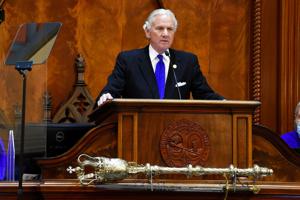McMaster pushes to require schools to reopen for in-person learning in State of the State address

(The Center Square) – Gov. Henry McMaster is asking the South Carolina Legislature to pass legislation that requires unwilling school districts to reopen for in-person learning, as well as legislation to implement a phased 15% income tax cut, a school-choice program and COVID-19 related liability protections for businesses.
McMaster presented his fourth State of the State address Wednesday evening to a joint session of lawmakers at the state Capitol in Columbia.
“This year, school districts in our state have received over $1.2 billion in COVID-19 relief from the federal government,” McMaster said. “Along with state funds, school districts have been provided the resources necessary to operate full-time, and teach in-person, five days a week. I ask the General Assembly to quickly send to my desk legislation for my signature that will require unwilling school districts to reopen their classrooms.”
McMaster also requested the Legislature to approve funding for $3,000 pay raises for every public school teacher, $25 million for public charter schools and $48 million to expand access to full-day kindergarten for low-income students.
McMaster proposed $13 million in lottery proceeds for a school-choice program, known as education scholarship accounts. Such a program would provide lottery funds to low-income parents to choose the school environment or instruction method that best suits their child’s needs.
McMaster highlighted an additional $123 million in state funds he hopes to set aside for another round of small business relief grants and asked the General Assembly to approve COVID-19-related liability protections for businesses, health care providers and schools that follow safety guidelines.
“We should be careful not to let litigation kill what the pandemic could not,” McMaster said.
McMaster proposed a five-year, 15% across-the-board tax cut for all personal income brackets. South Carolina’s 7% individual income tax rate is the highest in the southeast and 11th-highest in the nation, he said.
For the fourth consecutive year, McMaster said, his budget includes a provision to prevent taxpayer dollars from going to abortion providers such as Planned Parenthood. He also asked the General Assembly to pass a “heartbeat bill,” which would prohibit an abortion once a fetal heartbeat can be detected, and promised to sign it into law.
McMaster also asked the Legislature to approve a shield law to protect the identity of drug companies that provide the state drugs to carry out the death penalty by lethal injection.
“We have no means to carry out a death sentence in South Carolina, and the murderers know it,” McMaster said. “I ask the General Assembly: fix this. Give these grieving families and loved ones the justice and closure they are owed by law.”
McMaster also urged the General Assembly to reform or dissolve the state-owned utility Santee Cooper, saying incompetent leadership created “the largest nuclear power fiasco in modern times.”
“They have saddled their customers with billions of dollars in debt and have ignored the authority of our constitutional officers and this General Assembly, creating a toxic environment inside this statehouse,” McMaster said, noting laws governing the appointment of leadership have prevented him from taking direct action.
McMaster touted the state’s robust recovery after economic shutdowns enacted in response to the COVID-19 pandemic. The state’s unemployment rate is now 4.4%, the lowest in the southeast, after recovering from a 12.4% unemployment rate in April.
“In 2020, the pandemic may have slowed us down, but not by much,” McMaster said.
“How can you tout a strong economy, governor, when over 810,00 struggling South Carolinians have already filed for unemployment?” said Sen. Mia McCloud, D-Richland, who provided the Democratic response to the governor’s address. “Many are still trying to access pandemic assistance that will help them cover basic living expenses like food, medicines, mortgage payments and rent.
“Who says we can’t be pro-business and be pro-people?” McCloud said. “The two aren’t mutually exclusive.”
Disclaimer: This content is distributed by The Center Square

